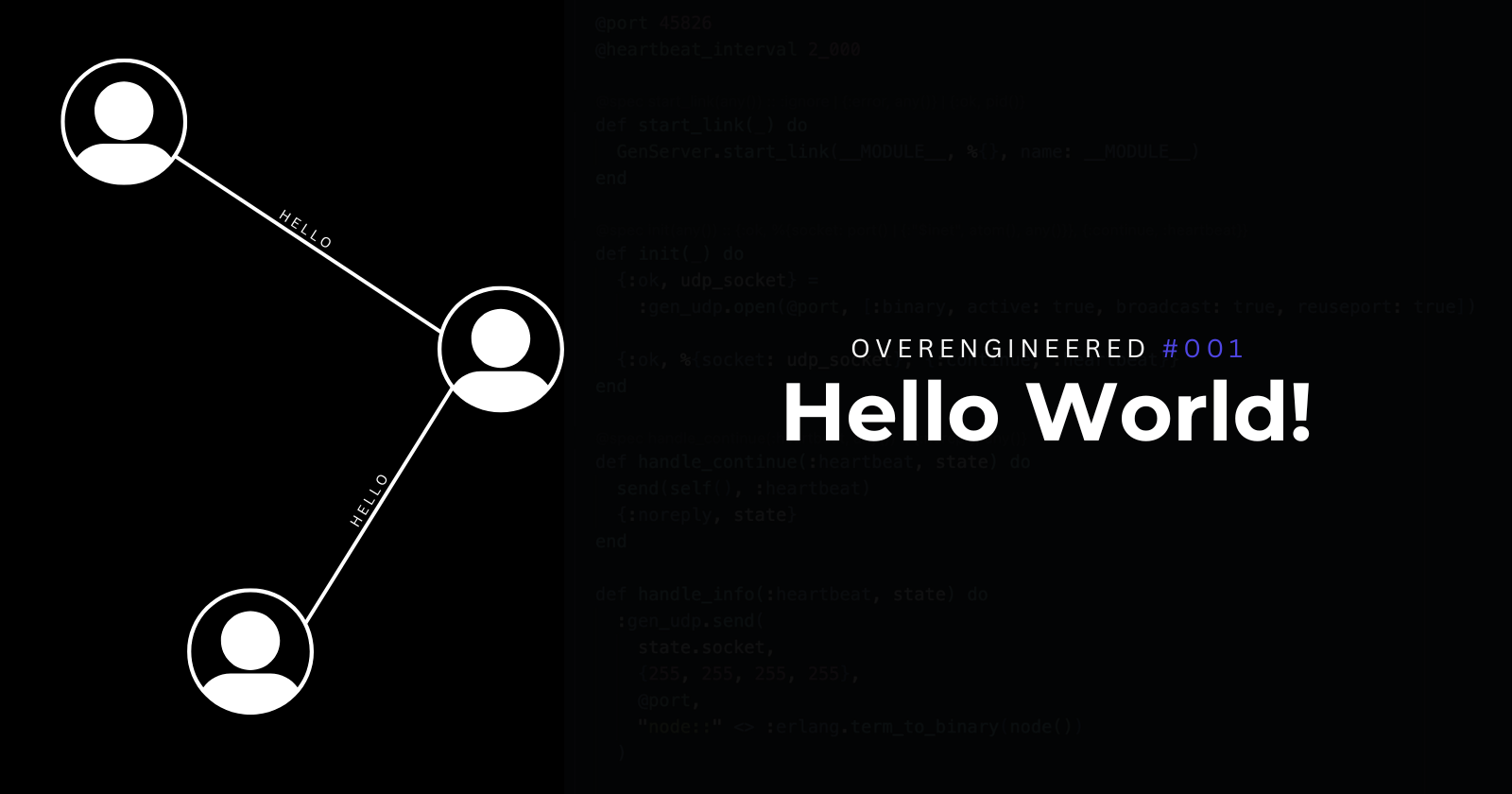Overengineered #001: Hello World
 Vince Urag
Vince Urag
Every journey into learning a programming language starts with a “Hello World.” I remember my first time compiling and executing my first program. It was exhilarating. It gave me a sense of accomplishment… even though it’s just a terminal that shows “Hello World.” Now, let’s revisit the same problem, equipped with the knowledge and experience we've gained along the way.
The Problem
Hello World in programming is just printing the phrase “Hello World”. Here’s how to do it in some languages:
// Elixir
IO.puts("Hello World")
// Python
print("Hello World")
// Ruby
puts "Hello World"
// Java
System.out.println("Hello World");
But, where’s the fun in that? In this article, we’ll be building a distributed Hello World system:
multiple distributed nodes
auto-discovery of nodes
whenever a node joins, all the other nodes will send a “hello world” message to it
Project Setup
To kick off, let’s create an Elixir project with a supervision tree and application callback:
➜ mix new distributed_hello_world --sup
We want to generate it like that since we will be creating GenServers that executes instructions on application boot up.
Node Auto-discovery
One of our requirements is for nodes to automatically discover and connect to each other. There should be no manual Node.connect/1 calls whenever there’s a new node. There are couple of libraries we could use for this like libcluster which supports a bunch of strategies. If you’re looking for a robust and well-tested clustering mechanism, you should take a look at those. But since we are overengineering here, we would roll our own using the idea from libcluster’s Gossip strategy.
How it works
For our clustering mechanism, we’ll use UDP broadcast for node discovery. We’ll use UDP (User Datagram Protocol) to send packets over the network without needing a connection. It’s perfect for fire-and-forget type of messages like “Hey, I’m here”.
When we use UDP broadcast, we send a packet to everyone on the local network by targeting the limited broadcast address (255.255.255.255). All nodes that listen to the same UDP port will receive the message.
NodeManager
Since we have our strategy laid out, let’s start building it. We’ll be dealing with UDP so we need to use Erlang’s gen_udp module. To send and receive UDP packets, we need to call :gen_udp.open/2 which opens a UDP socket bound to a port. We need to make sure that all the nodes send and listen to the same UDP port. For this example, we’ll use the port 45826.
Once we have the socket, we would be able to broadcast messages via :gen_udp.send/4.
Let’s play with it a little bit. Fire up your IEx shell.
iex(1)> {:ok, socket} = :gen_udp.open(45826, [:binary, active: true, broadcast: true, reuseport: true])
{:ok, #Port<0.3>}
iex(2)> :gen_udp.send(socket, {255, 255, 255, 255}, 45826, "HELLO WORLD")
:ok
iex(3)> flush
{:udp, #Port<0.3>, {192, 168, 68, 61}, 45826, "HELLO WORLD"}
:ok
Once you open a UDP socket, it associates the port number to the calling process so all the packets will arrive in the calling process’ mailbox.
We want the node auto-discovery and connection to happen on application startup. To achieve this, we’ll create a GenServer that opens a UDP socket upon initialization.
defmodule DistributedHelloWorld.NodeManager do
use GenServer
@port 45826
@heartbeat_interval 2_000
def start_link(_) do
GenServer.start_link(__MODULE__, %{}, name: __MODULE__)
end
def init(_) do
{:ok, udp_socket} =
:gen_udp.open(@port, [:binary, active: true, broadcast: true, reuseport: true])
{:ok, %{socket: udp_socket}, {:continue, :heartbeat}}
end
end
Now that the UDP socket is open, we can start sending and receiving packets. Since UDP messages arrive in the calling process’ mailbox, we can use handle_info/2 to receive it. Let’s also create a catch-all handle_info/2 and inspect its messages.
defmodule DistributedHelloWorld.NodeManager do
...
def handle_continue(:heartbeat, state) do
send(self(), :heartbeat)
{:noreply, state}
end
def handle_info(:heartbeat, state) do
:gen_udp.send(state.socket, {255, 255, 255, 255}, @port, :erlang.term_to_binary(node()))
Process.send_after(self(), :heartbeat, @heartbeat_interval)
{:noreply, state}
end
def handle_info(msg, state) do
IO.inspect(msg)
{:noreply, state}
end
...
end
Run the app while providing a name:
➜ iex --sname alice -S mix
Erlang/OTP 27 [erts-15.0] [source] [64-bit] [smp:14:14] [ds:14:14:10] [async-threads:1] [jit]
Compiling 1 file (.ex)
Interactive Elixir (1.17.2) - press Ctrl+C to exit (type h() ENTER for help)
{:udp, #Port<0.5>, {192, 168, 68, 61}, 45826,
<<131, 119, 10, 97, 108, 105, 99, 101, 64, 90, 101, 117, 115>>}
As you may have noticed, the calling node also received the UDP message. This is because we are broadcasting it to everyone on the local network… including us. Let’s handle the message. Since we now have the node name, we should be able to connect to it.
defmodule DistributedHelloWorld.NodeManager do
use GenServer
...
def handle_info({:udp, _, _, _, node_bin}, state) do
node = :erlang.binary_to_term(node_bin)
if node() != node && node not in Node.list() do
Node.connect(node)
end
{:noreply, state}
end
...
end
Make sure to add this GenServer to the supervision tree.
defmodule DistributedHelloWorld.Application do
use Application
@impl true
def start(_type, _args) do
children = [
DistributedHelloWorld.NodeManager
]
opts = [strategy: :one_for_one, name: DistributedHelloWorld.Supervisor]
Supervisor.start_link(children, opts)
end
end
Let’s test this out by spinning up two nodes, alice and bob. They should be connected automatically.
# Node: alice
➜ iex --sname alice -S mix
iex(alice@Zeus)1> Node.list()
[:bob@Zeus]
# Node: bob
➜ iex --sname bob -S mix
iex(bob@Zeus)1> Node.list()
[:alice@Zeus]
A bit of a problem…
Run alice node again then open up another terminal. On this new terminal, issue this command:
➜ echo "Test" | nc -u 127.0.0.1 45826
You’ll see that there’s an error that happened in alice node.
➜ iex --sname alice -S mix
Erlang/OTP 27 [erts-15.0] [source] [64-bit] [smp:14:14] [ds:14:14:10] [async-threads:1] [jit]
Interactive Elixir (1.17.2) - press Ctrl+C to exit (type h() ENTER for help)
13:20:04.779 [error] GenServer DistributedHelloWorld.NodeManager terminating
** (ArgumentError) errors were found at the given arguments:
* 1st argument: invalid external representation of a term
:erlang.binary_to_term("Test\n")
(distributed_hello_world 0.1.0) lib/distributed_hello_world/node_manager.ex:32: DistributedHelloWorld.NodeManager.handle_info/2
(stdlib 6.0) gen_server.erl:2173: :gen_server.try_handle_info/3
(stdlib 6.0) gen_server.erl:2261: :gen_server.handle_msg/6
(stdlib 6.0) proc_lib.erl:329: :proc_lib.init_p_do_apply/3
Last message: {:udp, #Port<0.5>, {127, 0, 0, 1}, 62202, "Test\n"}
State: %{socket: #Port<0.5>}
This happens because our app listens to a specific UDP port. Our app will receive all the packets sent to that port. We can solve this by scoping. To scope the message, we’ll just prefix it with node::.
...
def handle_info(:heartbeat, state) do
:gen_udp.send(
state.socket,
{255, 255, 255, 255},
@port,
"node::" <> :erlang.term_to_binary(node())
)
Process.send_after(self(), :heartbeat, @heartbeat_interval)
{:noreply, state}
end
def handle_info({:udp, _, _, _, <<"node::", node_bin::binary>>}, state) do
node = :erlang.binary_to_term(node_bin)
if node() != node && node not in Node.list() do
Node.connect(node)
end
{:noreply, state}
end
def handle_info({:udp, _socket, _ip, _port, _}, state) do
{:noreply, state}
end
...
Now, our app only listens and reacts to packets that are prefixed with node:: and ignores the others.
Here’s the full NodeManager code:
defmodule DistributedHelloWorld.NodeManager do
use GenServer
@port 45826
@heartbeat_interval 2_000
def start_link(_) do
GenServer.start_link(__MODULE__, %{}, name: __MODULE__)
end
def init(_) do
{:ok, udp_socket} =
:gen_udp.open(@port, [:binary, active: true, broadcast: true, reuseport: true])
{:ok, %{socket: udp_socket}, {:continue, :heartbeat}}
end
def handle_continue(:heartbeat, state) do
send(self(), :heartbeat)
{:noreply, state}
end
def handle_info(:heartbeat, state) do
:gen_udp.send(
state.socket,
{255, 255, 255, 255},
@port,
"node::" <> :erlang.term_to_binary(node())
)
Process.send_after(self(), :heartbeat, @heartbeat_interval)
{:noreply, state}
end
def handle_info({:udp, _, _, _, <<"node::", node_bin::binary>>}, state) do
node = :erlang.binary_to_term(node_bin)
if node() != node && node not in Node.list() do
Node.connect(node)
end
{:noreply, state}
end
def handle_info({:udp, _socket, _ip, _port, _}, state) do
{:noreply, state}
end
end
Nice! All nodes automatically discover and connect to each other. Now let’s move on to the next part, the Greeter.
Hello World, folks
Once a new node joins a cluster, it will greet all the nodes and get some greetings too. Just like the previous part, we’ll also be building a GenServer.
The Greeter
For us to know when a node joins the cluster, we need to monitor the nodes. We can do this by using :net_kernel.monitor_nodes(true).
defmodule DistributedHelloWorld.Greeter do
use GenServer
require Logger
def start_link(_) do
GenServer.start_link(__MODULE__, %{}, name: __MODULE__)
end
def init(_arg) do
:net_kernel.monitor_nodes(true)
{:ok, %{}}
end
def handle_info(msg, state) do
IO.inspect(msg)
{:noreply, state}
end
end
Let’s see what messages we receive when we monitor the nodes.
# Node: alice
iex --sname alice -S mix
{:nodeup, :bob@Zeus}
# Node: bob
➜ iex --sname bob -S mix
{:nodeup, :alice@Zeus}
# alice disconnects...
{:nodedown, :alice@Zeus}
To fulfill the requirements, we just need to send a greeting message to the node when we receive the :nodeup message. And whenever we receive the :greet message, we print it via Logger along with the name of the node that sent it.
defmodule DistributedHelloWorld.Greeter do
use GenServer
...
def handle_info({:nodeup, node}, state) do
GenServer.cast({__MODULE__, node}, {:greet, node()})
{:noreply, state}
end
def handle_cast({:greet, node}, state) do
Logger.info("Hello world from " <> inspect(node))
{:noreply, state}
end
...
end
Here’s the full code of the Greeter module.
defmodule DistributedHelloWorld.Greeter do
use GenServer
require Logger
def start_link(_) do
GenServer.start_link(__MODULE__, %{}, name: __MODULE__)
end
def init(_arg) do
:net_kernel.monitor_nodes(true)
{:ok, %{}}
end
def handle_info({:nodeup, node}, state) do
GenServer.cast({__MODULE__, node}, {:greet, node()})
{:noreply, state}
end
def handle_info({:nodedown, _}, state) do
{:noreply, state}
end
def handle_cast({:greet, node}, state) do
Logger.info("Hello world from " <> inspect(node))
{:noreply, state}
end
end
Just like the NodeManager, make sure to add it to the supervision tree.
defmodule DistributedHelloWorld.Application do
...
def start(_type, _args) do
children = [
DistributedHelloWorld.Greeter,
DistributedHelloWorld.NodeManager
]
opts = [strategy: :one_for_one, name: DistributedHelloWorld.Supervisor]
Supervisor.start_link(children, opts)
end
end
Let’s test our Distributed Hello World app by spinning up nodes alice and bob.
➜ iex --sname alice -S mix
Erlang/OTP 27 [erts-15.0] [source] [64-bit] [smp:14:14] [ds:14:14:10] [async-threads:1] [jit]
Compiling 1 file (.ex)
Interactive Elixir (1.17.2) - press Ctrl+C to exit (type h() ENTER for help)
iex(alice@Zeus)1>
Nothing happened yet. Now let’s observe what happens when we run bob.
➜ iex --sname bob -S mix
Erlang/OTP 27 [erts-15.0] [source] [64-bit] [smp:14:14] [ds:14:14:10] [async-threads:1] [jit]
Interactive Elixir (1.17.2) - press Ctrl+C to exit (type h() ENTER for help)
00:59:02.539 [info] Hello world from :alice@Zeus
iex(bob@Zeus)1>
Go back to alice and you’ll notice that it also received a greeting from bob.
# Node: alice
00:59:02.538 [info] Hello world from :bob@Zeus
Now let’s see what happens when a third node joins the cluster. Enter charlie…
➜ iex --sname charlie -S mix
Erlang/OTP 27 [erts-15.0] [source] [64-bit] [smp:14:14] [ds:14:14:10] [async-threads:1] [jit]
Interactive Elixir (1.17.2) - press Ctrl+C to exit (type h() ENTER for help)
01:02:19.497 [info] Hello world from :alice@Zeus
01:02:19.498 [info] Hello world from :bob@Zeus
iex(charlie@Zeus)1>
It got greetings from both alice and bob. Go back to both alice and bob nodes and see how it reacted.
# Node: alice
01:02:19.494 [info] Hello world from :charlie@Zeus
# Node: bob
01:02:19.498 [info] Hello world from :charlie@Zeus
Wrapping Up
So there you have it — a multi-node Hello World.
What did we actually do here?
built our own node-discovery mechanism via UDP broadcast
Node monitoring
an app that says hello to everyone in the cluster
Was it overkill? Absolutely — and that’s the point of this series!
Again, this is just for fun and learning. If you need a robust node-discovery mechanism, check out libcluster.
Link to full source code: https://github.com/vinceurag/distributed_hello_world
Awesome! I hope you had fun reading and following along this first Overengineered post. I’ll be making more of this so if you want this kind of content, feel free to subscribe to my newsletter. For suggestions/feedback, please use this form. If you want to join the fun and take a jab at the problem yourself, please tag me — I'd love to see what you come up with!
Happy overengineering and see you on the next one!
Subscribe to my newsletter
Read articles from Vince Urag directly inside your inbox. Subscribe to the newsletter, and don't miss out.
Written by

Vince Urag
Vince Urag
I'm a software engineer with 7+ years experience in backend engineering. My main focus is on distributed systems, concurrency, parallelism, etc. I usually dabble with Elixir/Erlang.